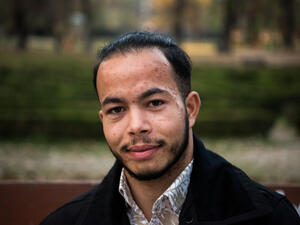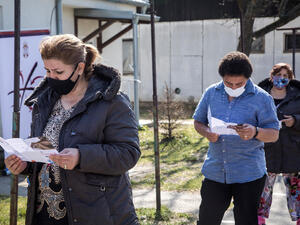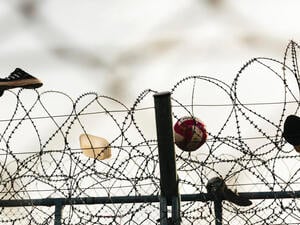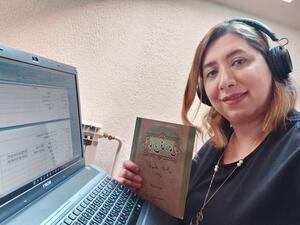Kosovo Crisis Update
Kosovo Crisis Update
The Exodus
Around 94,000 Kosovars have fled the province since March 24, and relief officials said many more were en route. By Tuesday morning 65,000 people had crossed into Albania, 20,000 into Montenegro and at least 9,000 into Macedonia. Relief workers said the majority were women, children and the elderly. Many of the arrivals reported they had been forcibly expelled often within minutes and often with little more than the clothes they wore, either by army troops, the police or paramilitary. Some said their homes were burned down even as they left their villages and towns.
Only a few men were crossing the border, but because there are no longer any international observers in Kosovo, the fate of other males remained unclear. There were unconfirmed reports of some spot executions, but Yugoslav authorities also imposed countrywide legislation preventing any male between the ages of 16 and 60, of whatever ethnic background, from leaving the country. The border between Serbia and Albania was closed Tuesday morning by Yugoslav authorities. Aid officials said there was no way to estimate the exact number of people expected, but eventually they could total hundreds of thousands in the largest flight of people in Europe since the war in Bosnia earlier this decade.
Of the estimated 3,500 people who arrived in Macedonia Monday, the largest one-day arrival thus far in that country, the majority came from the province capital of Pristina and the southern towns of Urosevac and Prizren.. The arrivals said one historic building, the centuries-old League of Prizren building which signified Albanian Unity, had been severely damaged by tank fire. The building had been recognized by UNESCO as one of international significance. They reported widespread shelling, looting and burning of houses though there were fewer troops on the road than previous days. None of these reports could be independently verified.
There had been widespread unrest and fighting between Yugoslav military forces and police and members of the Kosovo Liberation Army before the NATO airstrikes began. Between March, 1998, and March 24, 1999, a total of 460,000 people had been displaced. Approximately 260,000 people remained inside Kosovo as 'internally displaced' people, 100,000 made their way to European countries, 25,000 went to Montenegro, which together with Serbia comprise the Federal Republic of Yugoslavia, 30,000 had moved to other parts of Serbia, 18,000 left for Albania and 10,000 went to Bosnia.
The relief effort
As the numbers of people leaving the embattled province increased, an international relief effort moved into higher gear. UNHCR, the lead refugee operation in the region,began an emergency relief operation in addition to region-wide programmes which had been underway for several years. Jacques Mouchet, currently UNHCR representative in Islamabad was named Envoy to Albania and Macedonia and was expected in the area by Friday. A 12-person emergency team from Geneva with vehicles and other equipment was scheduled to arrive in Albania Wednesday to coordinate relief efforts there.
Contacts are underway with the Albanian government to identify sites for possible tented camps for new arrivals. UNHCR staff from other offices in the region were also being moved into Albania. Under a bilateral agreement the United Kingdom's Department for International Development was scheduled to begin lifting 42 metric tons of tents and blankets aboard an Ilyushin 76 cargo aircraft to Tirana. Tuesday. It is then expected to shuttle between various destinations and Albania with more supplies which will be distributed by the UNHCR emergency team. Other organizations and countries including ICRC, UNICEF, WFP, the World Health Organization and the United States said they would strengthen their teams in Albania by the end of the week.
More aid needed
Assistant High Commissioner Søren Jessen-Petersen chaired an emergency meeting of major donors in Geneva Tuesday. UNHCR identified aid priorities as shelter, transport and medical assistance and asked countries to make bilateral contributions according to those priorities. Donors were also urged to contribute to the existing $359 million consolidated appeal for the region issued earlier this year. For operations in the former Yugoslavia and Albania, UNHCR requested a total of $168 million and thus far has received $53.8 million. During the weekend, UNHCR received a $8.5 million pledge from the United States.
The World Food Programme told the donor meeting 10 metric tons of high protein biscuits had already been sent to the Albanian town of Kukes where many refugees arrived Monday and a further 40 metric tons of wheat and 10 metric tons of biscuits were scheduled to arrive Tuesday.
No more neutral observers
Personnel from the International Committee of the Red Cross (ICRC) and Médecins Sans Frontières (MSC) left Kosovo Monday, the last international observers in the region. The ICRC said their last delegates pulled out because they could no longer work effectively and after local authorities said they could not insure their security. In an earlier statement, High Commissioner Sadako Ogata expressed grave concern about the plight of civilians, especially because there were no longer any neutral observers. The lack of this international presence "does not mean impunity," she warned but pleaded with all of Kosovo's neighbours to keep their borders open. "I am asking all governments in the region and elsewhere in Europe to maintain their policy of open doors," she said.
Protection needs
On Tuesday, UNHCR said its main concern was to ensure that the protection needs of the fleeing Kosovars remained central to the overall response of the international community in the developing crisis. It appealed to all countries receiving the civilians to give them refuge within their existing asylum laws or, if necessary, to grant them so-called 'temporary protection.' During the earlier Bosnia crisis when European countries were faced with an overwhelming number of people fleeing the region and their regular asylum procedures were put under tremendous pressure, many capitals offered them 'temporary protection.' This measure effectively short-circuited more lengthy asylum procedures and allowed the receiving countries to offer the Bosnians immediate sanctuary.








